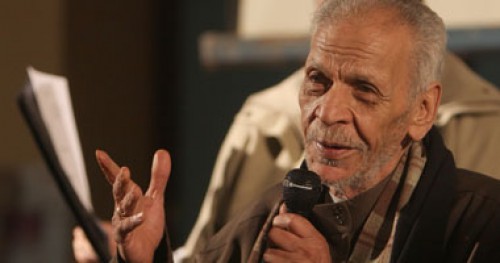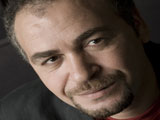Ahmed Fouad Negm, “A King among the Stars” is Gone
by Hamdy El-Gazzar and translated by Amani Elmawed / December 16, 2013 / No comments
Egypt’s poet of the Revolution has died, but his spirit and words live on.

Egypt's writer of the people and 'ambassador of the poor,' Ahmed Fouad Negm. Photo: ar.hao123.com
When Naguib Mahfouz died, I was part of a group of writers and intellectuals who met in Merritt center in downtown Cairo to plan a big funeral for Mahfouz. Among us was the biggest novelist for Arab writers, Ahmed Fouad Negm, who sat comfortably in his white gown and black sandals. He was our countryman, steady, original, and natural. At the time, Negm said something about how Mahfouz deserved to be carried around on a cannon like the Egyptian novelist Yahya Haqqi before him. Negm was referring to the state-organized military funeral for Mahfouz.

- “From Egypt” attempts to draw a cultural map of Egypt and the Arab world by profiling the artistic, literary, and political issues that affect the region via on-the-ground coverage of current events, publications, and the fight for freedom of expression.

- Hamdy El-Gazzar is an Egyptian writer and one of the 39 young Arab writers included in the Beirut 39 Project. His first novel, Sihr Aswad (Dar Merit, 2005) won the prestigious Sawaris Award, and was subsequently translated by Humphrey Davies (Black Magic, AUC Press, 2007). His second novel, Ladhdhat Sirriyya (Secret Pleasures) was published by Dar al-Dar in 2008. He is currently working on a third novel.
When Negm died this year on December 3 he was not carried on a cannon, nor was there an official funeral for him. Nevertheless, this was the most suitable way to say farewell to “the King of the stars”—as a common man, with many friends and mourners heaping their love and gratitude upon him. Because of this, people said goodbye to him in the manner that a popular poet should have been into.
During his lifetime “the King of the stars” or “Mr. Ahmad” was known in the country’s jails, meadows, books of poetry, and television screens, in its Hosh Qadam district, on Al-Ghorya street, in the Sayedna Al-Hussein Mosque, and at the top of Al-Zilzal house in Mokattam. When he died, farewells laced with tears came from all over.
Before he became a famous writer, Negm grew up an orphan, like the Egyptian singer Abdel Halim Hafez. As a young man he was sent to prison, loved women, and married his other half when life gave him the opportunity. He lived among creative people and ordinary ones. He never took off his favorite gown, and he never changed his dreamy revolutionary spirit. Consequently, he only lamented the passing of two leaders: Che Guevara, and Abdel Nasser.
When Negm lamented Guevara, he said: “Guevara died; Guevara died… the latest news on the radios.”
When Abdel Nasser died, he commemorated the leader by saying: “The fighter, the idol died…oh what a loss of a man for us.”
Though Negm wasn’t honored for his work until late into his years, it suited him to just be known as the “Ambassador of the poor.” When he was about to receive the Prince Claus Award, he was already preparing to leave, and died a few days before the ceremony.
Negm, who passed away at the age of eighty four, was never described as an old man in his life; he was skinny and tough like a stick of dried sugar cane. Nobody would say his vision was poor, but his eyes were deep black, and the most distinguishing feature in his wrinkled face. As a writer, his most notable features were his unabashed vision of the world and his rude words against corruption. Ali al-Ra’i, one of the biggest critics in Egypt, called him: “The poet of the rifle.” The French poet Louis Aragon once said: “This poet has the power to tear down fences.” Former Egpytian president Anwar Sadat, one of Negm’s opponents, even named him: “The Filthy Poet.” But when it was the writer’s turn to provide a name for himself, he chose “Al-Fagomi,” or the snippy man. Thus, Al-Fagomi professionally and creatively played his part as a revolutionary with his poetic, artistic, and political life. He didn’t conciliate with any leader—be they Nasser, Sadat, or Hosni Mubarak. Not to mention that he was one of the initiators of the January 25th Revolution and was a big source of inspiration before its advent.
Many years ago, in Cairo’s Liberty Square, we used to gather to listen to the music that Sheikh Imam would play on the oud, and hear young people sing the best of Negm’s lyrics, like those below:
“Mother Egypt” (1969)
(translated into English by Mona Anis)
Let our words be preceded by our greetings to all who are listening,
Little sparrow chirping rhymed words full of meaning
About a dark land, a moon,
A river, a boat and a shore,
And fellow travelers on a hard journey
And an image of a huge gathering
And processions
Reflected in the eyes of a beautiful young woman,
Who is the reason for my words and meanings.
Beautiful Mother Egypt
Wearing a tarha and a long robe,
Time’s grown old, and you’re still young,
It’s now departing, and you’re still coming,
Coming after a hundred and one nights,
Treading on hardship,
Smiling as always,
As strong as ever.
When you laugh, morning appears
After dark and dusk,
And the sun rises above you,
A young, playful and beautiful woman.
Islands of night
Are swept by the sea,
And dawn’s a high torch
Undrowned by the waves,
And the shore is looming
Near sunlit cities.
Come, give us a hand,
Help us;
No matter how rough the waves may be,
Together, with resolution
And perseverance,
We will make the crossing.
Mother Egypt, you’re like a ship;
No matter how rough the sea may be,
Your peasants are your sailors;
They will harness the winds.
The helmsman is a worker
And the oarsman, an Arab knight,
And the one up on the mast
Can see all that has passed
And all that is to come.
Two knots, and a third for luck,
You ride on the crest of a strong wave
To reach the shore safely,
Young, playful and beautiful.
And our sweet words carried by our greetings
Hover above the gathering once more,
Like a sparrow singing its merriment,
Dropping songs as if they were seeds
Kissing the land which receives them with joy.
They blossom,
They grow,
Become songs again,
Singing:
He who built Egypt
Was a sweet maker.
Now Negm “the King of the stars” has passed away, but we all know from physics that the stars we see today have been dead for millions of years—and yet they still send light to Earth. Negm, “the popular poet,” has died, but we know from life and history that the poet does not really fade or die. May you rest in peace “King of the stars.”




